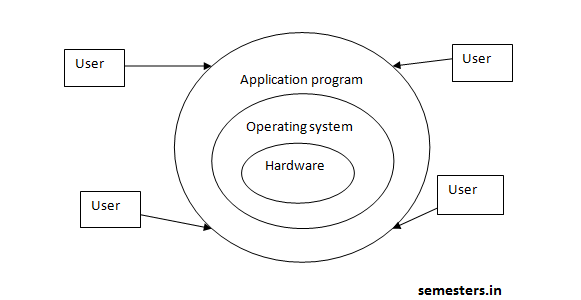Operating System:
The operating system may be considered as a collection of software program which allows a user to interact with the hardware .The operating system provides several routines which control the hardware and provide an environment for any user to execute their application program without knowing the details of the hardware.
“The operating system is system software which is loaded in the memory of computer at the time of booting process. It remains there all the time and provides a platform on top of which application program may run.”

Management function of an OS –
The OS are in two modes, single user mode and multi user mode . In single user mode, it is assumed that only one are user will have to access to all the resources of a computer system . In the multi user mode, The OS is designed to allow several user at a time .
Based on the resources, OS perform following four management function :
- Memory Management
- Process Management
- Device Management
- File Management
-
Memory Management:
The memory management function finds all the available free space in the memory and allocates it to the processes. The process is a program/ task under execution stage. The OS manages whole memory by dividing it into several blocks and partition. Every job under execution stage requires memory. If there exist two or more than two processes then the OS allocates the memory segment as per the requirement o f the job. When process is executed completely it finally free the allocated memory space.
-
Process Management:
The process management function of OS is related with allocation of process or job to the processor. The speed of processor or CPU is much faster than peripheral devices. So the scheduling is done in such a way that CPU remains idle for minimum amount of time. When a process waits for I/O to be completed, during that wait time, the CPU may be allocated to other process waiting for processor.
-
Device management:
The function of OS deals with allocation of devices to process. OS Schedules the I/O devices, I/O channel to process, whenever it requires In I/O scheduling, after finding the status of device, channels, and a schedule is prepared which states which device is allocated to the process.
-
File Management:
The file management of OS is related with management of files stored in to secondary storage. The file is considered as collection of logically related data item which are organized in records. These files may contain a set of commands, executable code or reports. File managements of OS keeps track of all information on files. It finds and records the following for all files:
Location, size, usage, status, etc. It also finds as to which process, which file is required, checks through the protection routine, opens the file if allowed, & allocates it to the process.
